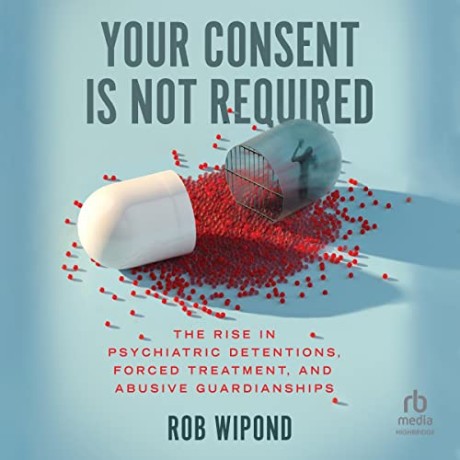Most Commented
Your Consent Is Not RequiredYour Consent Is Not Required




Description material

Your Consent Is Not Required: The Rise in Psychiatric Detentions, Forced Treatment, and Abusive Guardianships
m4b | 742.19 MB | English | Isbn: 1637741480 | Author: Rob Wipond | Year: 2023
Category:Physician & Patient Medical Ethics, Medical Ethics, Sociological Study of Medicine
Description:
Asylums are supposed to be in the past. However, though the buildings were closed, many of the practices lived on.
In fact, more law-abiding Americans today are being involuntarily committed and forcibly treated "for their own good" than at any time in history.
In the first work of investigative journalism in decades to give a comprehensive view into contemporary psychiatric incarceration and forced interventions, Your Consent Is Not Required exposes how rising numbers of people from many walks of life are being subjected against their will to surveillance, indefinite detention, and powerful tranquilizing drugs, restraints, seclusion, and electroshock.
There's a common misconception that, due to asylum closures, only "dangerous" people get committed now. But forced psychiatric interventions today occur in thousands of public and private hospitals, and also in group and long-term care facilities, troubled-teen and residential treatment centers, and even in people's own homes under outpatient commitment orders. Intended to "help," for many people the experiences are terrifying, traumatizing, and permanently damaging.
Driven partly by individuals' genuine concerns for the "mental health" of others, and partly by institutions entangled with goals of power, profit, and social control, psychiatric coercion is increasingly used to:
manage school children and the elderly
quell family conflicts
police the streets
control people in shelters, community living, and prisons
fraudulently increase hospital profits
"resolve" workplace disagreements
detain protesters and discredit whistleblowers
Thoroughly researched, with alarming true stories and hard data from the US and Canada, Rob Wipond's Your Consent Is Not Required builds an unassailable case for greater transparency, vigilance, and change.
In fact, more law-abiding Americans today are being involuntarily committed and forcibly treated "for their own good" than at any time in history.
In the first work of investigative journalism in decades to give a comprehensive view into contemporary psychiatric incarceration and forced interventions, Your Consent Is Not Required exposes how rising numbers of people from many walks of life are being subjected against their will to surveillance, indefinite detention, and powerful tranquilizing drugs, restraints, seclusion, and electroshock.
There's a common misconception that, due to asylum closures, only "dangerous" people get committed now. But forced psychiatric interventions today occur in thousands of public and private hospitals, and also in group and long-term care facilities, troubled-teen and residential treatment centers, and even in people's own homes under outpatient commitment orders. Intended to "help," for many people the experiences are terrifying, traumatizing, and permanently damaging.
Driven partly by individuals' genuine concerns for the "mental health" of others, and partly by institutions entangled with goals of power, profit, and social control, psychiatric coercion is increasingly used to:
Thoroughly researched, with alarming true stories and hard data from the US and Canada, Rob Wipond's Your Consent Is Not Required builds an unassailable case for greater transparency, vigilance, and change.
Join to our telegram Group
Information
Users of Guests are not allowed to comment this publication.
Users of Guests are not allowed to comment this publication.
Choose Site Language
Recommended news
Commented


![eM Client Pro 9.2.1735 Multilingual [Updated]](https://pikky.net/medium/wXgc.png)






![Movavi Video Editor 24.0.2.0 Multilingual [ Updated]](https://pikky.net/medium/qhrc.png)

